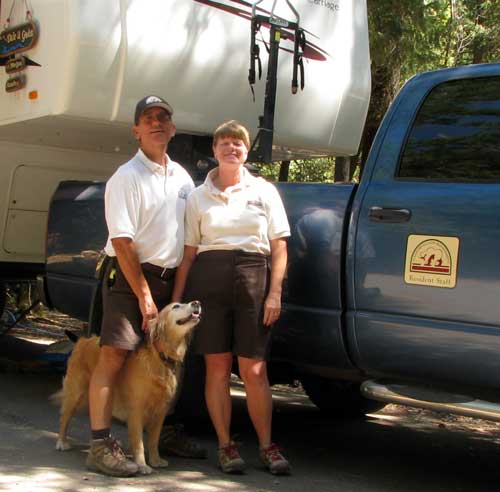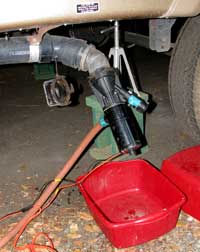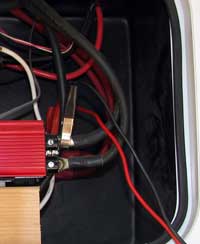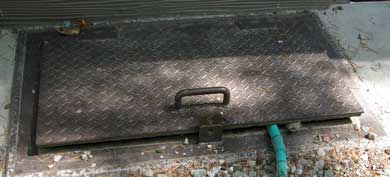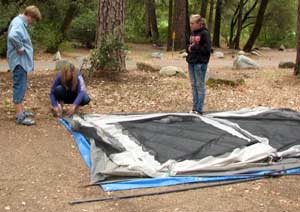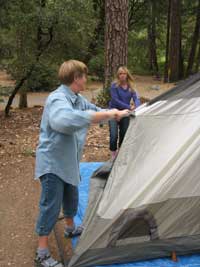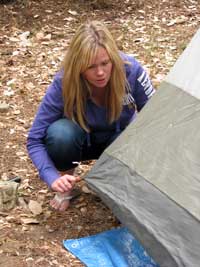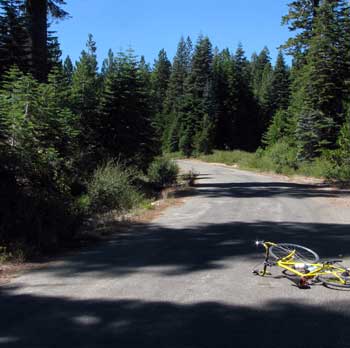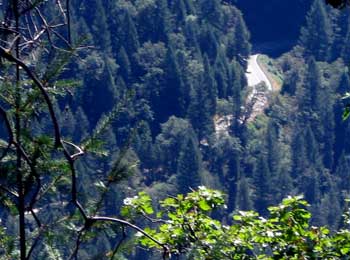 |
|
The Workamping Experience
Fall, 2010
|
| |

|
|
| August 9, 2010: This has been a traumatic beginning for us to jump from full retirement enjoying the beautiful state parks in New Mexico to full time workamping in northern California. We chose to take this employment opportunity to recover some of what we lost with recent truck maintenance and with Gwen's visit to the hospital emergency room in Albuquerque. We accepted two full time camp host positions to service six national forest campgrounds and one day-use area. We have been on the job now for one week. Our pay is the California minimum wage which is $8.50 per hour plus mileage reimbursement for the use of our vehicle. We work for a concessionaire, California Land Management (CLM) which has a very good reputation with workampers. We followed the Workamper News for three years before retirement thinking we would go that route so know of CLM. In this case, CLM has provided us with a full hook-up site plus uniforms and equipment. Our duties are to clean the 19 toilets scattered through the seven sights we service, plus register campers and collect fees. So far, registering campers is the most time consuming. Paperwork is the second most time consuming and cleaning the toilets is last. Most folks think the toilet cleaning is the most objectionable but these are all pit toilets which are much easier to clean than flush toilets. You just put on rubber gloves, spray them down with cleaner and wash them off. We must service them twice each day so they are never exceptionally dirty. We have already met some very nice campers and made friends with a few that will likely carry on into at least email relationships. I suppose the biggest obstacle for me was working for minimum wage. I haven't worked for minimum wage since my college days (attending college as a student in the 60's) and even then, the college always paid a few dimes more than minimum. CLM is like any other minimum wage employer, they do their best to get the lowest paid employee to do the majority of the work, hence the mounds of paperwork. It's only good business. I did it when I owned a business for twenty years (although I always paid slightly more than minimum). I'll take some more photos and show you what it's like to workamp as I have time. |
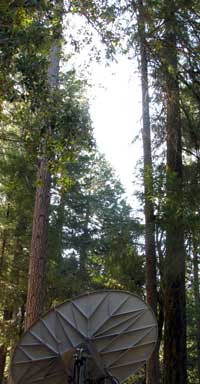 |
Tuesday, August 10, 2010: Our host campsite provided by CLM is in the middle of the Indian Valley Campground about 11 miles west of Downieville, CA. They provide us with 30 amps of electricity, water, company phone and a method to dump our holding tanks when needed. We are surrounded by tall trees but have a very tiny slit in the trees to the southwest. It took me about twenty tries but I finally got the Internet satellite signal by moving the tripod around. We also get DirecTV on the same satellite dish using a separate LNB (receiver) to get television. In this case however, the slit in the trees is so small we can get either Internet OR DirecTV but not both. We chose the Internet and have put DirecTV on vacation hold until the end of October when our contract has expired. Honestly, we have found we are so busy, we have no time for TV anyway.
What is "workamping". A workamper is basically a person with an RV who takes a seasonal job, usually at a resort or campground to provide a small amount of income and almost always a free location to park and live in the RV for the season. In some cases, like many state parks and some national forests, the workamper is NOT paid for their service, they are volunteers, but get a free camping location for the duration of their service. You can learn everything you need to know about workamping by subscribing to the Workamper News which I mentioned yesterday. |
|
| Wednesday, August 11, 2010: Guess who is only a little more than an hour from us? Yes, it's Ralph and Janet who are spending much of the summer in Graeagle, California. Ralph let us know of an Elks Club spaghetti dinner so we figured that would be a good time to drive over the mountain and join them for dinner. We haven't seen them since we left the Escapees park in New Mexico. |
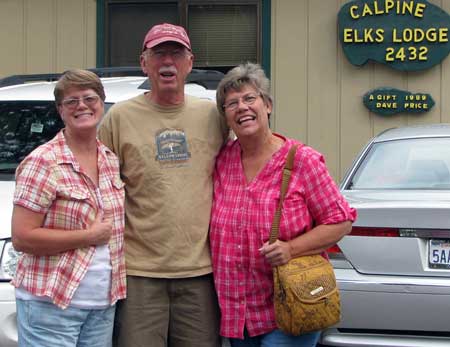 |
|
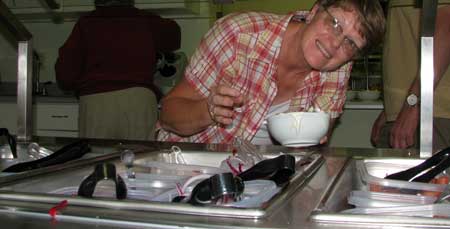 |
What a great salad bar to go with the Elks spaghetti dinner. There are many choices for things to add to lettuce. |
|
| There goes the diet. They really pile on the spaghetti and sauce and an ice cream sundae is only $1. Good thing I'm going on a long bike ride the day after this feast. We were able to participate because Tuesday and Wednesday are our days off from camp hosting. |
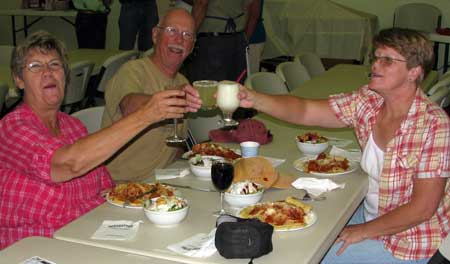 |
|
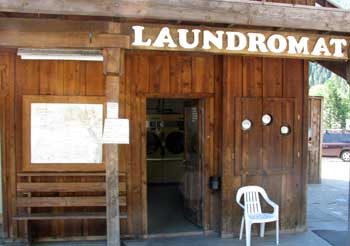 |
Thursday, August 12, 2010: The problem with working 5 days/week is you create laundry which must be washed on your days off. Downieville has one tiny laundromat with about 7 working top load washers and two driers. Still, we are happy to have them only 10.5 miles from our campsite. You can click the photo to see a view inside. |
|
Friday, August 13, 2010: Famous California hwy 49 is the hwy passing all our campgrounds and the county seat of Sierra County, Downieville, just 10.5 miles up 49 to the east. As 49 passes through Downieville, it becomes a one lane road crossing over the Yuba River on a one lane bridge. This is the main street of Downieville, click to enlarge.
I debated with myself the advantages and disadvantages of workamping before accepting the camp host position. I currently |
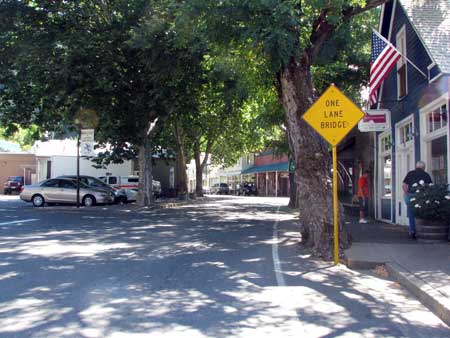 |
| teach community college business classes online for my community college in Oregon. My wage for teaching is 6.5 times the California minimum wage I'm currently earning so why not just teach another community college course or find another community college who needs additional online teachers. That seems like the obvious solution to additional income until you understand HOW the community college pays this wage. They will pay for "classroom time ONLY" so for a 3 unit course, they pay instructors for 33 hours of classroom time and THAT'S IT. The quarter is 11 weeks long so I get paid for 3 hours each week. The two courses I teach took me 300 hours of course development time EACH which was uncompensated. I needed that time to develop lesson plans, exams, assignments, study guides, etc. All instruction is by Internet so Web pages had to be built for instruction. Each of the textbooks is 800 pages plus and I had to read them to coordinate the instruction with the lessons in the textbook. Finally, once the course begins, all instruction and communication is by email and of course students always have questions. Try doing all of that in 3 hours each week. So even though the college claims to be paying instructors $55/hour, the instructor is lucky to get minimum wage. By the way, when I take my trailer to an RV dealer for repairs, whether it's in Oregon or New Mexico, they charge $95/hour to look at it. Hopefully this lesson will do more than show you why I'm working as a camp host, it will also enlighten you to the "real" compensation received by college instructors. Just imagine the real time it takes to read the assignments from 20 students, exams from 20 students, answer questions from 20 students in "3 hours per week" which does NOT include all the time it took to prepare the lessons in the first place. One more thing, my Pearl Izumi riding shorts are at least 15 years old and probably have 10,000 miles on them. It's time for new shorts. They are on sale at the bike shop in Truckee for $103 (regularly $130), that's more than I make in a whole day of work. (Yes, a good pair of shorts makes a HUGE difference when you spend 3+ hours in the saddle like I did on Wednesday in the Sierra Valley riding 50 miles.) Of course, when I was employed full time at my community college, it was less than half what I made in a day. Just a little perspective. |
|
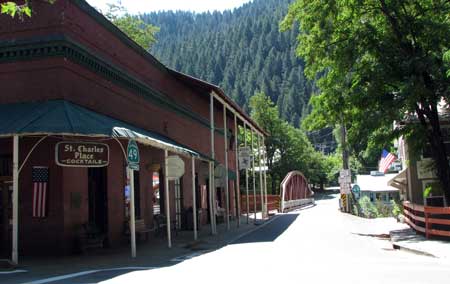 |
Saturday, August 14, 2010: (click the photo to enlarge) The camping experience at the six campgrounds we host is different from what we have experienced personally. First is the price of camping. The $21 per night charged for the dirt (not pavement, grass or gravel), fire ring, table, water faucet in the campground and pit toilet, we would expect to pay half that from the experience we had in Idaho, Montana and other states. |
|
| (You know ... I don't really mean "dirt" because there are some really nice campsites at the top of the mountain and those folks are camped on "dirt". I mean DUST. The kind of dust which bellows up behind your vehicle no matter how slowly you drive. Dust that seeps through a nylon tent and gets all over everything. I guess if you live in an apartment in San Francisco, then DUST might be a pleasure once each year.) Compare to the $10/night for the beautiful New Mexico State Parks we just left. Interestingly, not ONE camper has complained about the price of camping so Californians have been trained to expect little for their camping dollar. Second, about 90% of the campers are using tents. The rest are tent trailers and RVs. Some are very elaborate tent communities with outhouse tents to go along with their sleeping tents. Many camp sites have gas grills along with barbeques and dish washing tables. Also, many tenters are following a tradition of many years of camping in "this exact site". That also fooled us when we first began hosting, thinking, "have you not been around, there are so many other campgrounds much nicer". Third, our campgrounds have been crowded since we've been here. The sites are squeezed together with very little "elbow room". Remember how we like our "space" and love camping in the Arizona desert with at least a quarter mile of space around us from the next neighbor. Fourth is the socioeconomic diversity of these campers which I will spend a whole evening discussing. |
| Sunday, August 15, 2010: Today was a pleasant day on the job. Wayne and Char invited all the campground hosts to their trailer for sour dough pancakes cooked by Wayne himself. It was from a sour dough starter from 1860 so very special. Wayne is the "Site Manager" for this area and our boss. He keeps all the hosts happy and in supplies plus gives us whatever help we might need. Wayne and Char are camped at Sardine Lake at about the 6,000 foot level of the mountains above us. We are at the 2,300 foot level. All our campgrounds border the North Yuba River while many of the campgrounds above us are on small and medium sized lakes. The higher campgrounds are what I remember of my camping days although I never car-camped, I always backpacked into the wilderness areas even with my kids. That's one reason I find this kind of camping so strange. |
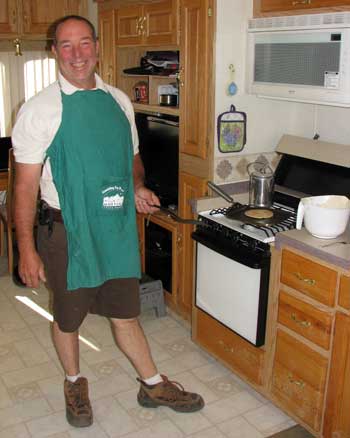 |
|
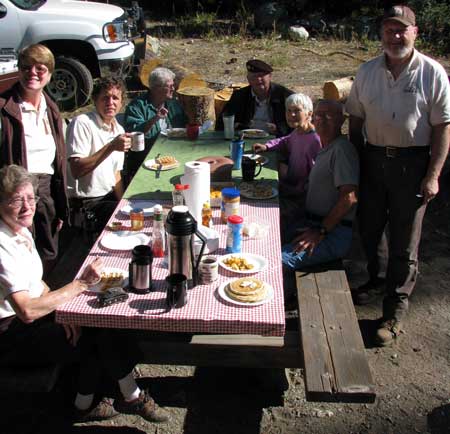 |
Each of our campground hosts must cover more than one campground so that makes everyone busy. Yet, we all found time to rush to Wayne and Char's for sour dough pancakes. Now we even have another meeting planned for a week from today.
The campground at Sardine Lake has great views of the Sierra Buttes. Click the photo to catch a glimpse of the Buttes from the Sardine Lake Campground.
After the meeting, Gwen went to work while I rode my road bike on up the mountain to Gold Lake, about 5 miles, then turned around and peddled (not coasted) |
|
| down the mountain back to camp, 42 miles. I worked hard, even though going down hill so got good exercise from the ride. Yes, I went to work after the ride and covered all campgrounds for the second round of the day. |
| Monday, August 16, 2010: Today was an exciting day for the kids in camp. The California Fish and Wildlife fish truck arrived to stock the river. Apparently they drive from one campground to another and get help from the campers to transport the fish from the truck to the river. Of course, the kids came running and were so excited to see, then carry buckets of fish from the truck to the river. The kids only had to walk about 50 feet from the truck to the river but the last 15 feet was down a steep bank so it was tough for some of the kids to carry a 5 gallon bucket of fish that last 15 feet. The "fishmen" seemed as excited to see the kids reaction to the fish as the campers. The truck was in our campground only about ten minutes then off they went to the next campground. Click the photo to see the kids at the river with a Dad taking photos of the whole thing. |
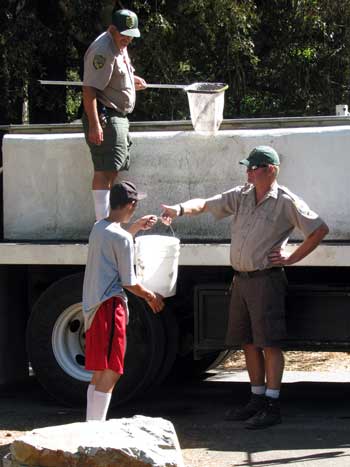 |
|
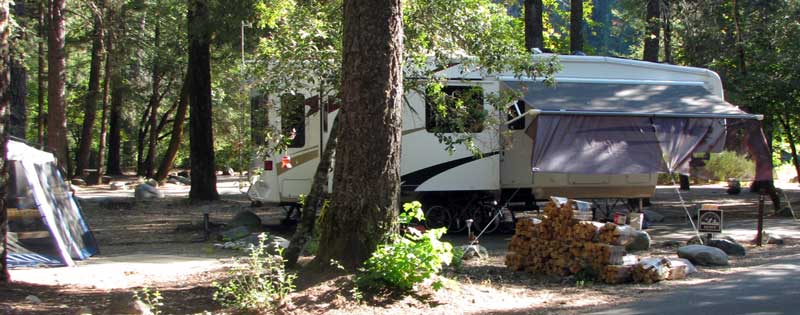 |
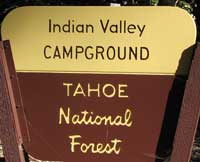 |
Tuesday, August 17, 2010: Our host site is in the only paved campground of the six we manage, Indian Valley. Site 2 is the first site the camper will see as they drive into Indian Valley. There are only 17 sites in this campground. Ours has 30 amps of electricity, water, phone, and a method to dump the holding tanks by running a hose 60 feet to the pit toilet nearby. All the rest of the sites have only a table, fire ring and parking space. Water is nearby from a faucet (two for the campground). There are two garbage bins which are collected on Monday and Friday each week. This is the most popular campground of the six we service although nearly all are full on the weekends. We are shaded nearly 100% of the time, good thing we don't need sun. Being under the trees is great during the summer months but we have learned NOT to be under the trees when it starts to rain. The trees will continue to drip LARGE drops onto the trailer even after the rain has stopped. Even though this is the "Tahoe National Forest", the beautiful Lake Tahoe is a 2 hour drive from our campground so 4 hours round trip. |
|
| Wednesday, August 18, 2010: The crystal clear North Yuba River is the reason most campers use our six campgrounds. The North Yuba has good stream flow and is clear, unlike most of the New Mexico Rivers we found to be muddy. This view of the North Yuba is only a short 3 minute walk from our campsite. The water is warm enough to swim but most camper float the river in simple inner-tubes. |
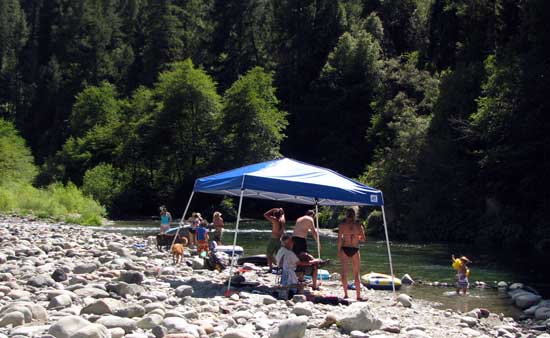 |
|
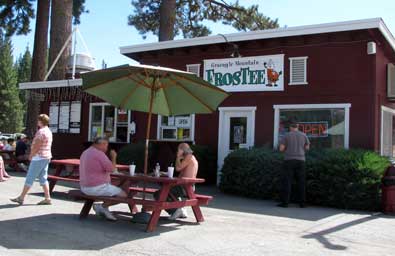 |
Thursday, August 19, 2010: We've really been doing well on our diet since leaving our friends, Ralph and Janet last March. I have personally dropped from 195 lbs to 165 lbs. Of course, the thousand miles of cycling has helped along with the diet. But Ralph and Janet still have an influence over us. On our way to visit them in Graeagle, California we just couldn't pass up this little "Frostee" stand. Boy was that a GOOD frostee! I just have to ride a few more miles to keep the frosty off the belly. |
|
| Friday, August 20, 2010: Downieville is only 10.5 miles east of our campground. It is the county seat of Sierra County. The whole county has a population of about 3,500 while Downieville has a population of 391. It has ONE bank, fortunately, it is OUR bank, Wells Fargo. The branch is very small tucked away in the corner of a building on main street. Apparently it has four employees, probably all part time. I consider it the world's smallest Wells Fargo branch. |
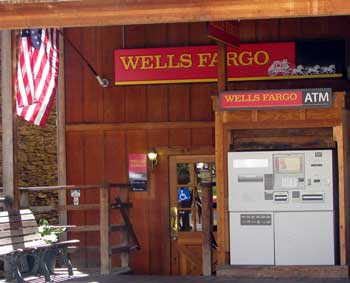 |
|
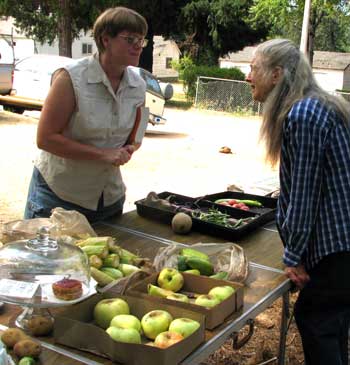 |
Saturday, August 21, 2010: I started the first campground round today at about 7 am which is a little earlier than usual. The little town of Camptonville is about ten miles to the west of us and has a farmer's market on Saturday until noon. With Gwen's help, we finished the first round by 11:30am, changed clothes and headed to Camptonville in time to talk with the farmer's. We really wanted home grown tomatoes. Carolyn is one of the farmers and she did not bring in tomatoes today. Gwen got her to promise to bring in 5 big tomatoes next week and save them for us. Gwen did buy a small basket of salad tomatoes from another vendor. We will be happy until Wednesday when we will shop in Reno. |
|
| Sunday, August 22, 2010: This is campsite 12 in the Carlton Campground. I consider it one of the better campsites since it is right on the North Yuba River. It has a large level space for a tent and is about 50 feet from a "nicer" pit toilet. It is also relatively private compared to some of the other sites in this campground. All the sites in Carlton including this one are less than 100 feet from Hwy 49 which can be busy at times. Like all of the campgrounds, Carlton is dusty which can be a problem if campers don't creep in/out of their sites with their vehicles. |
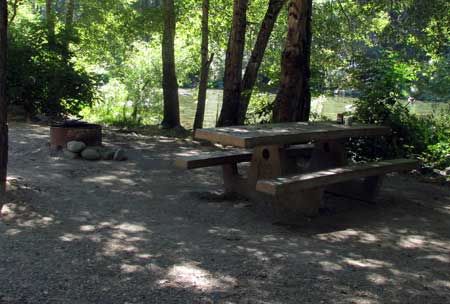 |
|
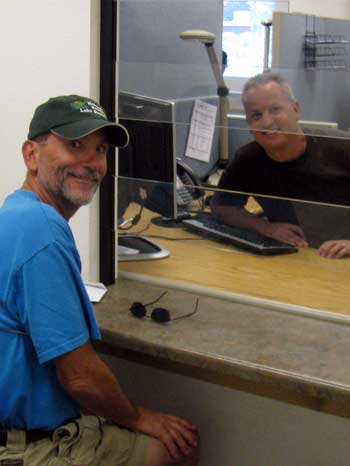 |
Wednesday, August 25, 2010: Today was a day for many errands in Reno just before visiting Ben, Kim, Chloe and Mindy. One of those errands was to the social security office to ask a few questions. The answers convinced me that NOW was the time to submit my application for social security. I had chosen to wait past my 62nd birthday knowing that my check would increase for each month I delayed the application. But Mr. Moore convinced me that waiting was not such a good idea and had the figures to prove it to me. So the government is going to start paying me NOT to work starting September, 2010. It was actually a pleasant experience at the social security office in Reno. Mr. Moore obviously enjoyed his job and for once I was glad I had a personal visit with a government employee rather than applying online at socialsecurity.gov as all their signs and videos were begging those in the waiting room to do. Oh! My beard is just for my camp host job. I believe camp hosts should have a beard to help be the "cheerful old guy at the campground". |
|
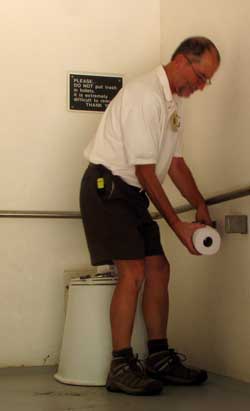 |
Thursday, August 26, 2010: Many campers think that cleaning pit toilets is the worst part of being a camp host. Some workampers even refuse any job which includes toilets. I suppose if you've never had to deal with crap, it might be repulsive but I worked my way through college shoveling chicken sh*t for four years. I always said I was the best chicken sh*t shoveler they ever had at the NASA lab on the UC Davis campus. The most important part of this job is to be sure there is plenty of toilet paper. NO camper ever complains about TOO MUCH toilet paper but if the roll is down to three little sheets, you'll hear them throughout the campground. It's been nearly a month of camp host duties and only once was the pit toilet so bad I had to drive back to my campground to get the hose. One thing Gwen and I have a theory about ... we at first couldn't figure out why there was so much crap splattered on the inside of the upright. Our theory is that many people EAT crap (like fast food, bagged snacks, lots and lots of beer, etc.) so their crap splatters |
| all over the inside of the upright. Gwen and I eat healthy so we have healthy crap that just plops to the top of the pyrimid. The photo at left is the "G" rated view. If you are brave, click the photo for the "R" rated view using the brush invention given to us to clean the inside of the upright. The sign on the back wall says, "Please don't put trash into the toilet, it is extremely difficult to remove." It won't be ME digging for your trash in these pit toilets! |
|
| Saturday, August 28, 2010: After our first round of the campgrounds Gwen and I drove to Peterson's Corner for a little lunch break. On the way, we watched for evidence of a wildfire at Bullard's Bar Reservoir between our campground and Nevada City. Several campgrounds had been evacuated from the area and those campers were showing up at our campgrounds. We did see several roads closed which were headed into the wildfire area. Anyway, our waitress arrived to take our order and told us we |
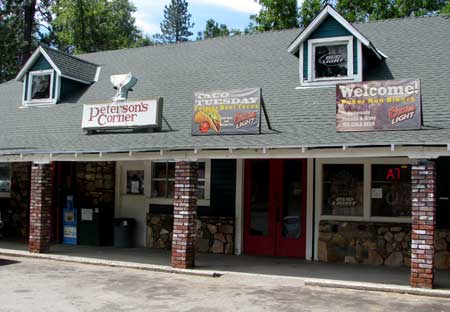 |
| would not be charged sales tax on our meal today to honor the firefighters in the area. We were wearing our camp host uniforms which she misunderstood to be firefighter uniforms. We accepted the appreciation gift. Before you get upset that the nearly bankrupt state of California is now missing the sales tax on our $14 lunch you must understand that we are Oregonians and never have to pay sales tax on ANYTHING. So far the governments of the states of California, Arizona, New Mexico, Utah and Nevada have benefited from us visiting those states. Meanwhile NO resident of California, Arizona, New Mexico, Utah or Nevada has given OREGON government anything when they visit OUR state. Oregonians refuse to pass a sale tax law. Maybe I'll suggest to the Oregon legislature an 8% sales tax on EVERYTHING unless you can produce an Oregon driver's license. With an Oregon DL, you don't have to pay any sales tax in Oregon. So we appreciate Governor Arnold's gift to the firefighters which benefited us today. Perhaps Governor Arnold would be so nice as to waive sales tax for camp hosts on the weekends when EVERY campsite is full. That seems like "fighting fires" to us. That statement is NOT meant to subtract from the importance and dangers of firefighting! You can click the photo to see the only view we could get of the fire. |
|
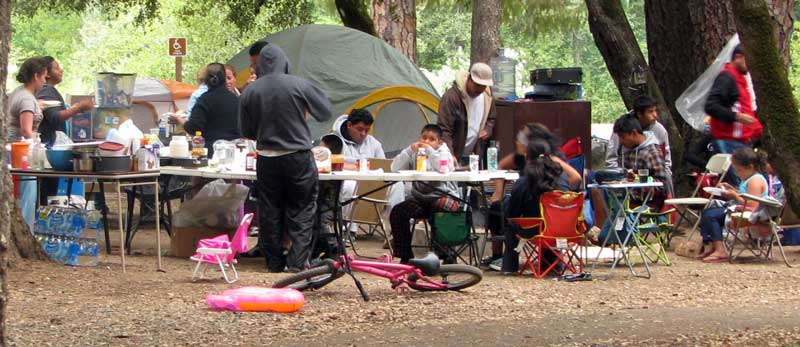 |
| Sunday, August 29, 2010: Family camping is a popular thing to do with our campgrounds. Often, families will rent multiple sites then come from various parts of the state to one park for a weekend or more as a family reunion style camp meeting. This weekend we were fortunate to have a Latino family from Stockton rent three sites around us. Family is very special to Latinos. All weekend we heard laughter, singing and as if everyone in the family were all talking at one time. They always seemed excited about the conversations around them and especially for the meals prepared. The weather cooled off this weekend so that's why you see sweatshirts and long pants. The nice part of this Latino family, they could have a wonderful time without making the camping weekend into a beer fest. So many campers arrive, start drinking and don't stop until the day it's time to leave. Those groups make a different kind of noise than the fun we heard happening with our Latino neighbors. It also reminded us of the New Mexico we left to come to work here. |
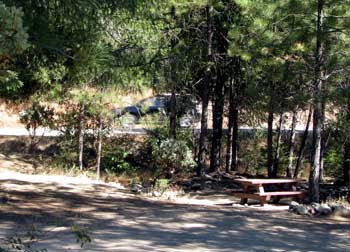 |
Monday, August 30, 2010: This is a wonderfully quiet day after a busy weekend, the calm before the storm of Labor Day. Labor Day is completely booked with every space in all six campgrounds reserved. The photo shows space 10 in the Rocky Rest Campground. The car in the background is traveling at 55 mph on Hwy 49. Three of our campgrounds have campsites this close to Hwy 49. So a tent camper would be sleeping only 20 - 30 feet from the Hwy. Yet they love it and many report returning year after year. I don't get it. Only another 22 miles up the road and they could be in Wild Plumb campground, off the road and not in the dust. |
|
| Tuesday, August 31, 2010: Sunday night was the appreciation dinner for all California Land Management (CLM) employees in the Tahoe National Forest area. There were probably 30 of us at the Los Dos Hermanos Restaurant in the tiny town of Sierraville California. The food was great and quickly served, the restaurant handled our large party very well. We have only been with the company for a month but we felt like family and laughed a lot telling the latest story of the campers in our campgrounds. Gwen and I have the six campgrounds no one else wanted because they are the busiest, open early in the season and close last because they are at 2,200 feet rather than all the rest which are at 4,500 feet or higher. CLM management was represented by Red who is "the right hand of Eric, the owner". Red came from Coarsegold, California for this meal. Red is standing on the right getting ready to take a photo. Click the photo to see our appreciation gifts (in addition to the meal). |
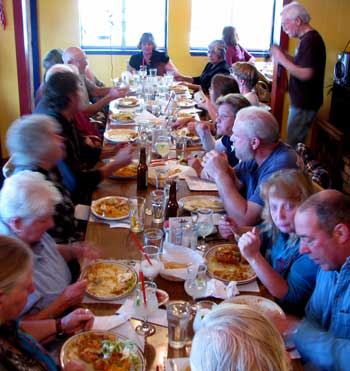 |
|
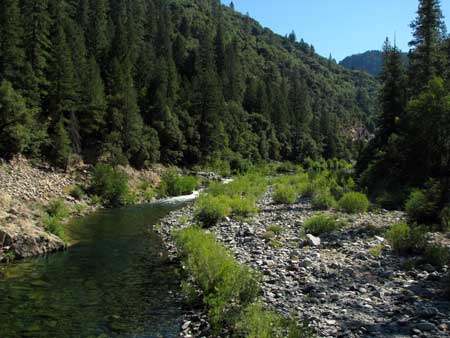 |
Wednesday, September 1, 2010: The North Yuba River is why our six campgrounds are so popular. Most campers come to play in the river, some come to fish the river, some pan for gold and others float the river in tubes. The photo shows the North Yuba as it flows into the Rocky Rest Campground. The California Fish and Game stocked the river again today. Note the clear blue sky. The sky has looked just like that every day in August with the exception of two days when we saw a few clouds. Click the photo to enlarge. |
|
| Thursday, September 2, 2010: Just up the mountain from Downieville is the town of Sierra City. It's 12 miles east of Downieville on Hwy 49. As you drive through this tiny town, the library is on your left with racks of books on the porch for sale. Gwen spotted it so we stopped to learn if they had her favorite author. I don't believe she was successful but it's another source for books in the future. Like Downieville, Sierra City has the river on one side and a steep mountain on the other so most of the properties are on the side of a mountain canyon. |
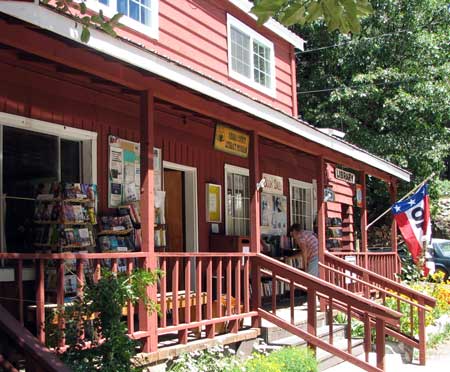 |
|
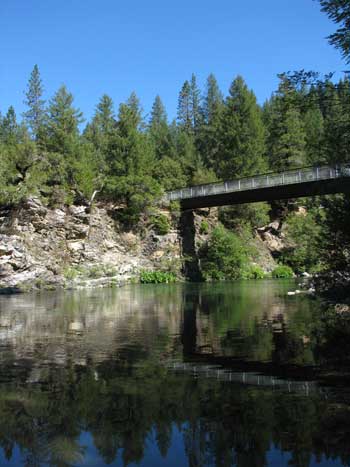 |
Friday, September 3, 2010: This is the day most Labor Day campers have arrived. It has been surprisingly easy with many huge family groups renting multiple spaces where we can check in multiple sites by talking to just one camper. By the end of the day, we have been able to register about 85% of all the campers. Others who were not in their camp or who are arriving tomorrow will be registered tomorrow. Now the challenge is to be sure all these campers have plenty of toilet paper and clean bathrooms for the next three days. So while Gwen's doing THAT tomorrow, I'm going for a bike ride. Well, I did work alone TODAY until 3 pm for the first round catching all the early arrivals so I don't feel too badly about leaving her to work while I play, besides, I'll cover the late afternoon round. I achieved my goal of cycling 500 miles in 30 days yesterday so I've set a new goal of 600 miles in 30 days beginning tomorrow.
The photo is of the walking bridge over the North Yuba River at Rocky Rest Campground. It leads to a favorite swimming area and to the North Yuba trail heading up-river. |
|
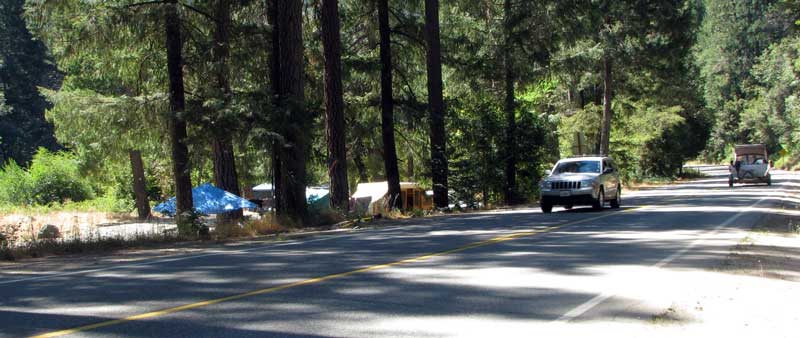 |
| Saturday, September 4, 2010: Over Labor Day weekend all our campsites are full. Our six campgrounds are located just off Hwy 49 in the Indian Valley Recreation Area. Many of the sites are right off the highway like site 16 at Carlton Campground shown here. These folks are camped about ten feet from the pavement of Hwy 49. A friend, Marlene Richards is camphosting in Oklahoma and keeps a Website of their experiences. She wrote me today asking if we REALLY charged $21 per night. She could not believe the high fee for the little we offer. I am also surprised at the high fee but not one Californian has complained of the charge. On the Labor Day weekend the fee increases to $23 per night. Can you imagine paying $23 for site 16 just ten feet from a 55mph highway? I took this photo toward the end of a 3 hour bike ride. My bike is laying down on the other side of the road on the shoulder. It's hard to see at the base of a tree. |
| Sunday, September 5, 2010: Joe (in the dumpster) and his brother-in-law Bob are locals who make extra money during the summer months by dumpster diving for returnable bottles and cans. Joe is the true dumpster diver, he literally dives to the bottom of every dumpster breaking open every sack to retrieve all bottles and cans. Joe has a large trailer which he tows behind his Toyota 4-runner and fills the trailer with cans and plastic bottles. Bob fills his Dodge pickup truck with all the glass bottles. The trash pick up is on Monday and Friday so Joe and Bob usually arrive a few hours before trash pick up. The concession company we work for approves of this practice because it pays for trash pick up by volume and when Joe has completed his diving, the bin is usually half what it was before he started. Many of the campers know of this practice and leave large bags of recyclables next to the bins for pick up. I've seen Joe's trailer completely full more than once and heard estimates that he makes $1,000 per week probably better than the amateur gold panners. |
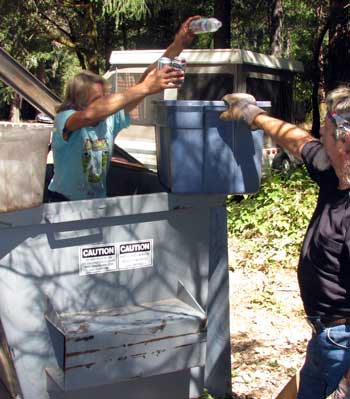 |
|
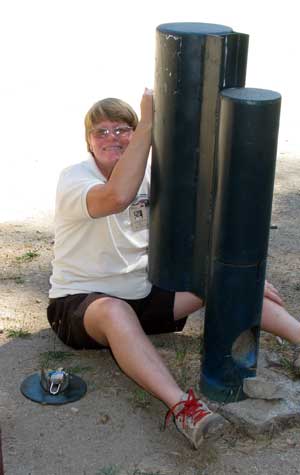 |
Monday, September 6, 2010: One of our duties is to retrieve the fee envelopes from the six fee tubes, one located at each of the six campgrounds we host. The fee tubes are steel tubes with a slot in the top to drop the fee envelope. The tube is hollow with a door sealed and locked with a pad lock. The pad lock is accessed through an opening similar to the one in the photo. You must put your hand with the key and your arm into the tube reaching high inside the tube to the lock and blindly insert the key into the lock. This fee tube has been "improved" with a larger tube and no bottom to the tube for access through the bottom to the lock. Once unlocked, the whole bottom falls off a center shaft onto the dirt below. This is very difficult and sometimes takes minutes just to get the key into the lock. Then, of course, we must reassemble the whole works which can be just as difficult. Of course there is no way to know if anything is in the tube before removing the door. Additionally, the envelopes often hang-up inside the tube so we must invent ways to get them to fall. Whoever invented these things should have to use them. Pass your pointer through the photo to see Gwen at work. |
|
|
|
| Tuesday, September 7, 2010: During our days off (Tuesday and Wednesday) we do our housekeeping chores such at laundry, vacuuming and dumping the holding tanks. The tanks are dumped into the pit toilet cistern located 60 feet from our trailer. The gray water tank is not problem, it can be dumped by gravity feed as many times per week as needed, usually twice each week. The black water tank is not as easy. The company has provided us with a macerator which attaches to the sewer connection. The 12 volt power for the macerator comes from the inverter cables located only a few feet away. The macerator motor chews up the black water and pumps it through a garden hose to the pit toiler cistern located about 60 feet away. I unlock the cistern door, raise the lid, place a rock under the lid to keep the lid from crushing the hose. The black water contents are pumped through the hose into the cistern. Of course I dump the gray water tank second to flush all black water from the hose and macerator pump. This works very well and fortunately does not have to be completed but every three weeks. Our trailer is connected to a hose bib so I am able to flush the black water tank with water each time I macerate. |
| Wednesday, September 8, 2010: Remember the fire I mentioned about a week ago. I found it today. About a 1000 acres burned and it all looks like the photo to the right. The area is heavily wooded so the area was lucky the firefighters attacked this fire so strongly. It could have been much worse. |
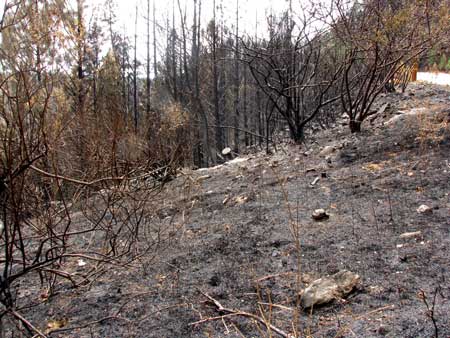 |
|
|
|
Thursday, September 9, 2010: So how many blondes does it take to erect a tent. Well, in this case, it takes three. After figuring out that a few tent parts were missing they improvised and got the tent standing. Gwen's daughter Lesa, her granddaughter Courtney and son-in-law John are visiting for a few days from southern California. The first night threatened a little rain and the rain fly for the tent was missing so we had some worried campers but they stayed dry. This morning they all went with Gwen to see what a camp host does. I worked on paperwork. No one came back saying it was awful work so I guess they weren't grossed-out with toilets. They live in the desert so anything looks good to them this time of year. We've checked our reservations and our campground is full again this weekend so Labor Day does NOT mark the end of camping in this area. |
|
|
| Friday, September 10, 2010: Just next to the Cal-Ida Campground is a single lane paved forest service road climbing up the side of the North Yuba River canyon. The road begins climbing from the 2,200 foot level at the river with a steady ascent to at least 6,000 feet. The total climb is 15 miles long and I've done this on my bike a couple of times. On the ascent you get a glimpse between the trees of Hwy 49 below next to the Yuba River. There is very little traffic on this road but it is paved for the 15 miles I've ridden it. In another four miles I would reach the Eureka Diggings, whatever that is but the road was beginning a steep descent and I didn't want to have to climb my way back to the top so that trip will have to wait for another time. |
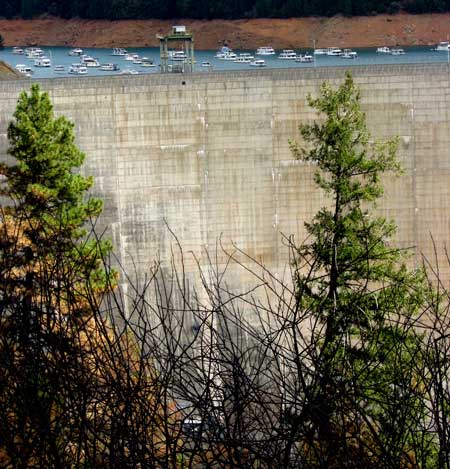 |
Saturday, September 11, 2010: Located about 18 miles from our campground is the Bullards Bar Reservoir. The reservoir is created on the North Yuba River by the Bullards Bar Dam, one of the 40 highest dams in the United States at 645 feet. The dam was completed in 1969 to control flood water and provide irrigation and power. The two lane Marysville road passes over the top of the dam which gives drivers (and bicyclists) and extra thrill. This is truly and impressive dam. Be sure to click the photo to see the reservoir behind the dam. |
|
| Just next to the dam is the Emerald Cove Marina which was certainly busy on weekends and especially on Labor Day weekend. Houseboats can be rented at the Marina and used to travel the extensive waterways created by the dam. Click the photo to get the full view of the marina. |
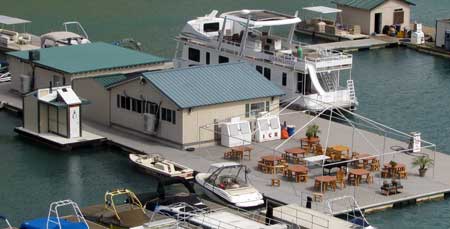 |
|
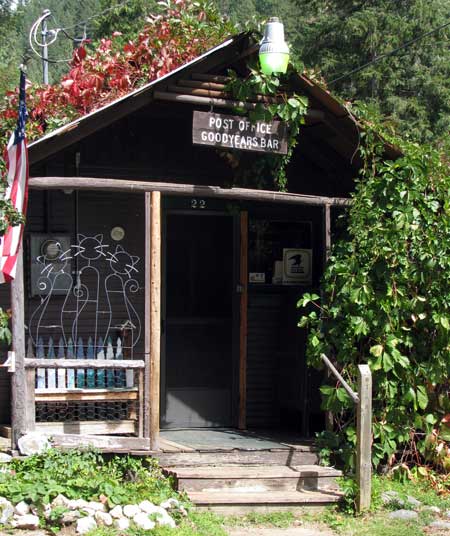 |
Monday, September 13, 2010: Apparently the Postmaster to our little post office likes cats. There is a tiny little area between our campground and Downieville called Goodyears Bar. This is where we get our general deliver mail while we are camped here for another 6 weeks. This is an area of mostly summer vacation homes next to Goodyears Creek and the Goodyears Bar on the North Yuba River. The post office is here probably because of tradition and history. Anyway, Goodyears Bar is about 7 miles from our campground which makes it 4 miles closer than Downieville. We have tried to reduce our paper mail to zero but no such luck, we still have a few important papers which arrive by US Mail and a few papers which must be sent by US Mail. However, easily 99% of our correspondence, bill paying and banking is done online. We have also learned that both UPS and Fed Ex will deliver packages to us in our campground. |
|
| Thursday, September 16, 2010: We got some good-news/bad-news today concerning our host positions at these six campgrounds. The good-news is that we will both remain working 40 hours per week until the end of October even though the number of campers has deminished. (Some may call that the "bad-news") The bad-news is that our relief host is leaving for Idaho so we must cover the six campgrounds seven days/week rather than five days with two days off. It's not really MORE work since the campgrounds are mostly empty except for weekends now but it does mean we must be present for the whole week. We can still work in short shopping trips and laundry trips but can't really get away for a whole day. We took these positions to make a little additional income and that will continue, we will just be tied more to the campgrounds. |
| Saturday, September 18, 2010: When I began writing about workamping I promised "the reality". My intention is to give a final "review" at the end of our employment but yesterday I was reminded of some of the negatives of workamping. We spend most of our time dealing with people rather than cleaning or preparing campsites and pit toilets. One of the duties we have is to remind campers of the rules of the campground especially when they are broken. When we visited the many New Mexico State Parks this summer, we would always have to check in with a "camp host" whose duty it was to make sure each camper was registered. Only one of those hosts felt they needed to read EVERY rule to us before giving us our park pass. In our case, fortunately, 95% of the campers generally follow the rules we must enforce. The rule most often broken is the quiet hour beginning at 10 pm. Usually the noise comes from a camping group who comes to a campground for an alcoholic drinking party. These groups generally bother the other campers with their noise so the camp host must ask the offending group to be quiet. This week we had one of these drinking party groups visit our campground. I had to ask them to observe the quiet hours when they continued their loud talking after quiet hours. If you like to play the part of "parent, policeman, teacher, person of authority" to adults who are acting like children then becoming a "camp host" is for you. As I said, these campers are less than 5% of the campers we have experienced. The camp host must also clean up after these "misbehaving" drunks. I took a photo of the present they left us when their drunken bodies have had their limit of booze and they almost make it to the pit toilet. This is an ugly photo which you don't want to view but if you really want to see the "reality" of what a camp host must clean after drunken campers visit a campground then click here. I've only had to clean two pit toilets like this one in the 6 weeks we have been hosts hence the statement that 95% of campers are easy to deal with. No doubt the other campers are as appalled by such behavior as I am. |
| Sunday, September 19, 2010: There is one in our party who is happy no matter where we are. Morgan is happy so long as we have water for her to swim or lay in. I think she would prefer leashless freedom which we have in the Arizona desert yet she's always happy to go for a walk around the campground and enjoys meeting other campers and their dogs. |
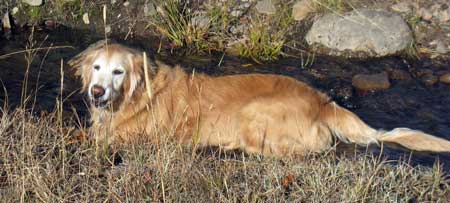 |
|
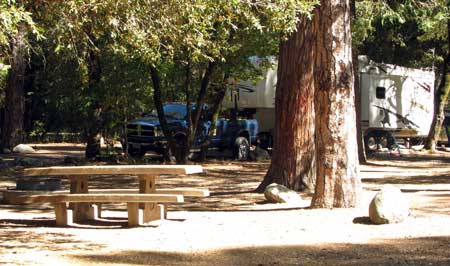 |
Wednesday, September 22, 2010: For the first time since we arrived the campground is empty. What a pleasure to have a quiet campground without other camper's choice of music, nervous barking dogs and the other noises from the crowded conditions in the campground. We actually had only two campers in all six campgrounds combined but more are due in. So now we have time to clean out fire pits and rake the clutter. |
|
| Friday, September 24, 2010: Our friends from Grants Pass, Oregon, Bobbie and Bob stayed the night in our campground before moving on to Yosemite so we had a party with Janet and Ralph (who are also from Oregon). We dined at the Mountain Creek Restaurant in Sierra City. It's known as the "umbrella restaurant" because they have outdoor seating under umbrellas. We also learned they have a real creek running through the middle of the dining patio. It was a little chilly but most everyone was prepared except me. Click the photo to see a nice view of the live creek in the middle of the patio. For my review of the restaurant see my Yelp rating by following my link on the home page. |
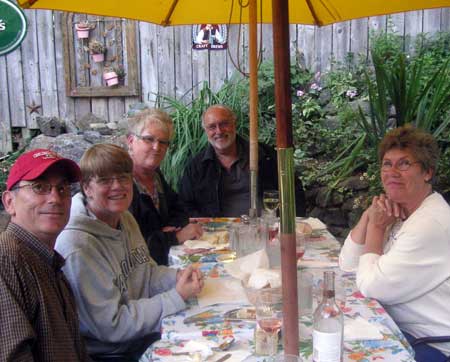 |
|
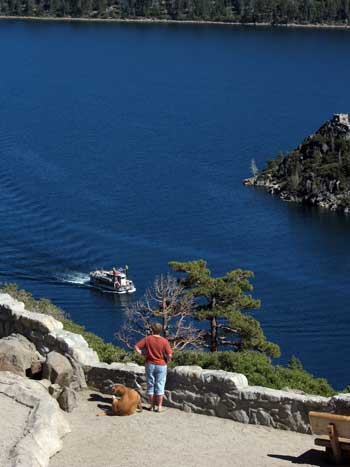 |
Saturday, September 25, 2010: Yesterday we took a long shopping trip to South Lake Tahoe, the California side. This passes the west shore of Lake Tahoe, one of the most beautiful lakes in the USA. I lived on the north shore of Lake Tahoe for 13 years before moving to Oregon. This lake is 12 miles wide by 20 miles long with an average depth of 1,000 feet. The clarity of the lake is to 110 feet. The lake is at 6,224 feet elevation in the Sierra Nevada Mountains straddling the California, Nevada state lines. The US Coast Guard maintains a presence on the lake because the lake is in two states. I've owned two sailboats on this lake. I would wait for the red warning flag to fly before going sailing, that's when it's fun. There are 10,000 foot peaks around the lake and I've been on the lake when the waves were high enough that dropping into a trough between the waves caused everything to disappear except mountains of water around the boat. I've also seen the waves high enough during a wind storm for surfers to surf the lake. Be sure to click the photo to see one of the most photographed scenes in the USA. Note Gwen and Morgan in both photos. |
|
| Sunday, September 26, 2010: When we first arrived, our friends, Kathy and Terry who have been working as camp hosts since April, warned us of "dashers". Each of our six campgrounds has a camping instruction board at the entrance to the campground. The instruction board tells the camper they must pay the $21 nightly camping fee within 30 minutes of arrival. A registration envelope is provided where the camper is to complete personal information such as name, address, type of car, number in the party, campsite occupied and amount in the envelope. This envelope containing the fee is to be dropped into a fee tube like this one. Gwen and I retrieve the envelopes and record the information in our occupation report. About half the campers follow instructions and deposit to the fee tube. Some ignore the fee procedure entirely and wait for someone (like the camp host) to come ask them to pay. We have registration forms different from the envelopes which we complete from an interview with the camper and collect the camping fee. Then there are "dashers". The dasher completes the envelope, puts the envelope tab receipt on the site post as if the fee has been paid then put the envelope on the dash of their vehicles. When we come to check the registration (since there was nothing in the fee tube for their campsite) they act surprised, then "find" the envelope on their dash which they give to us. Their intention was to NOT deposit the fee unless someone forced them to. I've met many dashers. Today I met my first "trunker". This camper had the completed fee envelope in the truck of her car and admitted she was not going to pay unless "the ranger asked for it". I suppose, if people paid what they owed without being told, cleaned up after themselves in their campsites and in the pit toilets and followed campground etiquette rules such as quiet hours after 10 pm there would be no need for a camp host. |
| Monday, September 27, 2010: Not all Californians are "campsite thieves. Here's a positive report. Yesterday evening a camper came to our door to rent a site. I was thinking a site in Indian Valley where I'm camped and they were standing. I began to prepare to register them. They explained that they wanted a site in the campground down the road but there were no envelopes to place the fee in the tube. So they searched out the other campgrounds until they found the camphost to be sure to pay. In another case, this morning we had some campers leave after camping in Rocky Rest for two weeks. They left their campsite clean and raked for the next camper. Many campers rake their site when they arrive but this was the first I'd seen where the camper raked the site on leaving. A final story: A camper arrived with a motor home and towed vehicle. They insisted on paying an "extra car" charge because the campsite allowed only one vehicle. I had to assure them that we considered their motor home a camping unit so there was no extra vehicle charge for the towed vehicle. Most campers do their best to avoid extra charges while this camper wanted to be sure they paid what was owed. Fortunately MOST campers are just like these campers. |
| Wednesday, September 29, 2010: Today I got a Grandpa fix by visiting Chloe in Reno. She is eleven months old and pretty happy about most everything. Her Father, Ben was home with her and her Great Grandparents (my parents) came to visit also. My two sisters, Sandy and Dorana did the driving from northern California to Reno. We had a great time with good food and of course everyone watching Chloe do her thing entertaining all the relatives. She has been crawling only for a few days so it was exciting to see her scoot across the floor. Boy are Ben and Mom, Kim, in trouble now. Pass your pointer through the photo and you'll see Chloe make one of her faces. |
 |
|
| Friday, October 1, 2010: We have made it to the last month of our commitment to California Land Management campground hosting. The campers have slowed down considerably, in fact, we have only about a dozen campers in all six campgrounds combined this evening. Fridays are usually the busiest. However, something is happening early this next week, we have enough reservations to fill our campground. And many of those are camping for the limit of 14 days. August was our busy month. I made an interesting observation and have a theory. We had a wide range of campers during the busy month. Some had expensive equipment while others had only minimal camps. It was during the month of August we had our most complaints from one camper about another. My theory is that many of our more "affluent" campers come from neighborhoods with like minded individuals with similar incomes. It's a neighborhood they carefully chose for the schools, safety and comfort. We also had campers from poor neighborhoods. These are areas with high unemployment and homes usually rented and in disrepair. Now these two types of campers are neighbors in a campground with canvas homes which aren't sound proof. In general, the "affluent camper" complained about the music, quantity of occupants, noise coming from the "poor campers". In a previous life, I was a teacher at a school with a population coming from the poor neighborhoods. I could see, the poor campers were actually on their "best behavior" but that behavior was still not to the standards of the affluent camper. What I find interesting about the affluent camper is they have left their chosen neighborhoods to move temporarily into a campground where they no longer have a choice of neighbors. Their next door camper might come from a similar living situation but just as likely might come from a "slum neighborhood". Now they are living within 30 feet of each other with NO sound proofing possible. So the affluent camper wants the camper next door to change to match their idea of what camping is rather than tolerate this different culture. It's even more evident when a Hispanic camping group arrives. They love their music and family activities and lots of loud but happy noise comes from their camping area. Some campers have figured this out and tend to bring friends and family with them then rent all the surrounding sites around a central meeting area. Essentially, they've brought the neighborhood with them. Fortunately, we had only a month and a half of trying to make the camping experience enjoyable for all these diverse groups. Now, most of the campers are spread around since there are so few of them and they are older with an RV rather than a tent. Soon we will be back to our own style of camping. Oh ... one other observation. Everyone in our six campgrounds is "camping" but we are at "home". |
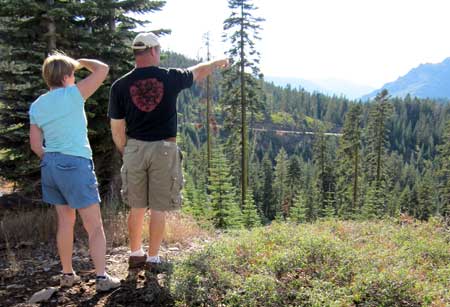 |
Sunday, October 10, 2010: Today was a travel day to Jackson Meadows Reservoir where the "Opps Manager" resides for all this area. It's a 2 hour mountain drive. Fortunately, Wayne, or "Site Manager" offers to take us in his vehicle. It turns out to be a single lane, mostly dirt road to the reservoir but with great views along the way. Food is waiting for us at the end of the drive. Wayne is pointing out the tip of the reservoir as we round a bend. Click the photo to see the view Wayne and Gwen are seeing. |
|
| Tuesday, October 12, 2010: My camping host paycheck may come from California Land Management but I really work for Gwen. Today she decided it was time to clean out the fire pits from three of the campgrounds we host. That means shoveling all the ashes from the pits into plastic bags and putting the bags into the dumpster bins. It's not my idea of fun but one of the duties we are to perform. We keep getting mixed messages as to WHEN CLM wants to close all the campgrounds. Yesterday, it was October 28 but today we were told October 24, less than two weeks. So Gwen decided we should get the pits shoveled. It's hard work, the bags are heavy and they often tear so you get ashes everywhere including yourself. I'm not complaining, Gwen is a hard worker and probably did more than half the pits herself. I just wish it had been MY idea. |
| Saturday, October 16, 2010: Today we celebrated the last week of work with CLM at our favorite restaurant in the tiny town of Sierraville, California. Los Dos Hermanos (The Two Brothers) is a fine Mexican restaurant. Ralph and Janet are sitting behind me on the left while Kathy and Terry are sitting with Gwen. Today was Kathy and Terry's last day working for CLM while our last day will likely be about a week. We were told our water will be turned off on October 25 so we will probably move on October 26. During our dinner we talked about our next meeting which will happen during Thanksgiving in Bouse, Arizona. We all plan to be in Arizona for most of the winter months enjoying the Arizona sunshine and temperatures. Ralph and Janet have been enjoying their summer, not working so it was easy for them to make fun of the four of us who have been working much of the summer. At least for Gwen and I, we hope to never be working again. |
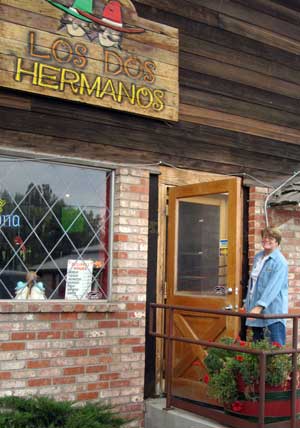 |
|
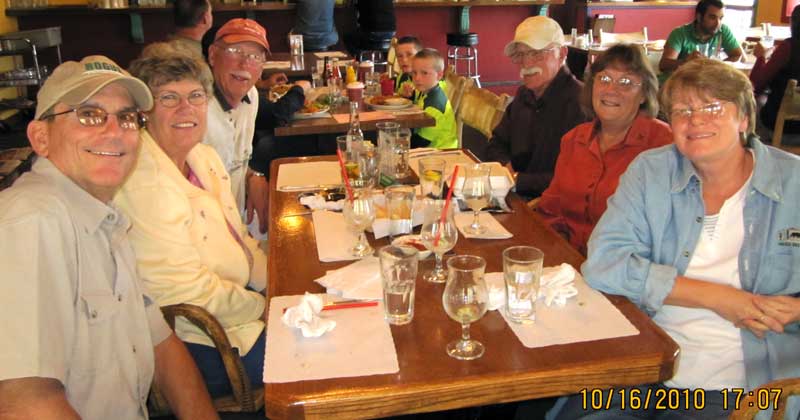 |
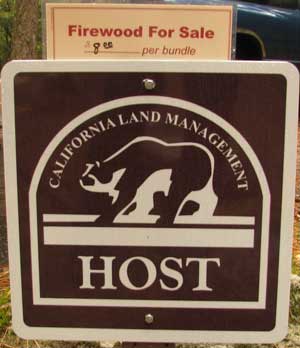 |
Monday, October 18, 2010: We are only one week from the end of our contract in working for California Land Management as campground hosts. For my final evaluation of our Workamper experience I’ll begin with the positive. Working as a campground host was not as bad as I had expected. We have heard and continue to hear stories from other hosts about rowdy campers and hard to tolerate situations caused by a low class of campers visiting the parks. We had very few problem campers and none that did not obey our requests to quiet the noise or pay for extra cars, etc. Additionally, the cleaning of the pit toilets is far easier and quicker than cleaning a flush toilet. Even the worst toilet messes were fairly easy to clean because they were near a hose bib and I was able to hose down the mess and clean up quickly. The |
part of the job which takes the most time is dealing with camper arrivals and registrations. Nearly all the campers, say 97% are very pleasant to deal with, glad to be at the campground and happy to have a camp host to greet them and to take care of the campground. Some campers even offered us treats or invited us to eat with them. The most physical labor required for the job was clearing the ashes from the fire pits and loading the ash bags into garbage dumpsters. We just made sure not to fill the bags too heavily.
California Land Management has been a fine company to work for. Our pay was automatically deposited into our checking account and we were paid regularly for the use of our truck. We were also very lucky to have a wonderful “Site Manager”, our immediate boss, and “Opps Manager” the boss above him. They have made our time here enjoyable and always followed through with everything they promised. We hope both will remain our friends for the rest of our lives. We also had some great co-workers and other hosts who were always helpful and the folks we had fun with. Again, we’ve heard stories of having to work for Site Managers, Co-workers or Opps Managers which were NOT pleasant so we are grateful for all those we got to work with during our three months. Our campsite at Indian Valley Campground had water, power and a method to dump our holding tanks at any time which we appreciated. Finally, the camp host job did exactly what we wanted it to do; it got us back to “financially zero” by paying the medical bills we created with our two day visit to a hospital emergency room in May.
Now for the “deal-breakers” with workamping. California Land Management has many types of jobs available to workampers. Campground hosting is one of those and the one we did which I’m commenting on here. Some of the other jobs are Site Manager and Opps Managers which I’ve mentioned above. The campground maintenance person works at many campgrounds fixing things. There are also retail store clerks, food cart vendors, and marina workers too. So, the first deal-breaker to keep us from ever doing this again is using our own truck. We were paid 30 cents per mile to use our $35,000 diesel truck (2004 price) to drive from one campground to another. We were paid honestly for our mileage but the CLM policy is to pay “from gate to gate”, not for driving inside the campground. CLM wants the host to “walk the campground”. Some of the hosts we know were paid that way. So I guess CLM expects the host to carry the broom, mop, bucket, sprayer and all the rolls of toilet paper needed to service the multiple pit toilets spread throughout the campground. Even if you don’t own a diesel truck you should be able to imagine how 30 cents per mile will not begin to cover the cost to move an 8,500 lb vehicle for a short distance. Additionally, we covered six campgrounds with an average of 3 starts per campground per round with two rounds per day. That’s 36 starts per day times 5 days per week or 180 starts per week. 30 cents per mile will NOT pay for a new starter on the truck either. Just driving into any one of the campgrounds is risking damage from other camping drivers, trees, stumps, boulders or even the miscellaneous gear thrown in the pickup bed. It wouldn’t matter if the damage was our own fault or someone else, 30 cents per mile would not cover our deductable either. You could get around this deal breaker by becoming stationed at a single campground where you could wheel around gear in a wagon. Or, the company could supply a truck for multiple campground hosting. Or, you own an older, smaller pickup where fuel mileage is better and small damage risk is no big deal.
The second deal breaker has to do with our retirement lifestyle. At the beginning of this page I explained that this was not our style of camping. The sites are too close, too expensive, and dirty. The only tent camping I’ve ever done was backpacking. We have enjoyed our retirement and generally move every two weeks and otherwise enjoy our days by visiting the area or being “tourists”. Our camp host responsibilities kept us in one place for three months and kept us near our trailer to help campers with their problems. So, we had to do our jobs rather than continue to enjoy our retirement.
The third deal breaker is dealing with the 3% of the campers who are essentially “low class”. First, let me say, if you are a “people person” who enjoys visiting for hours with campers, listening to stories about their kids, jobs, camping gear, vehicles, hobbies and ex-spouse then this may not be a negative for you. Anyway, part of the host job is to “keep control” of the campground. Many campers go camping to leave social rules at home and essentially begin drinking alcoholic beverage by the case as soon as they arrive. Those campers tend to be loud in one way or another and bother other campers. The host must ask that they follow the quiet hour rules and the host usually must clean up the mess after they leave. The only real power a host has comes from the respect the camper might have for the uniforms we must wear. We can call the sheriff and hope that someone responds other than that, we have no power. When I began this review I stated that we had no campers who did not respond to our requests but we were lucky. We’ve been told stories of other host experiences which weren’t so pleasant and the potential is always there. The whole time as a host I felt like a parent, teacher and policeman who must ask the campers to “behave”. At the very least, half of the campers never intend to pay for their space unless someone comes to ask them for payment. Most gladly pay their “rent” while others are obviously disappointed that they had not left ten minutes earlier and avoided the fee. Again, if you are a person who likes to be “in authority” and likes to visit with a variety of personalities, none of this may be a negative for you.
Finally, not a deal breaker but an annoyance, many campers come unprepared and the first thing they do is come to the host to ask to borrow something. We’ve been asked for a bicycle tire pump, duck tape, tent stakes, WIFI connection (off our satellite Internet), axe, playing cards, swim suit, change for the pay telephone (which was never repaid), and bicycle. I’m sure there was more but that’s all I can remember for now. It’s a good thing these folks did not know I have an air compressor or that would have been in demand to inflate their river floatation devices. You must learn to say “NO” or expect to lose some of your gear.
To end on a positive note, the California minimum wage of $8.50 per hour really added up quickly. I told of my community college teaching position paying $59/hour but because of the limited hours they pay, our first two weeks wages working for CLM was nearly what I earn in an entire quarter working for the college. Additionally, the long hours in August turned into much shorter hours in September and October where we were paid to sit at our site relaxing while waiting for customers to buy firewood. In other words, we were paid for eight hours where the physical part of the work was really only 2 hours. Just remember, there were days in August we worked 14 hours each and were paid for only 8 each. I believe CLM knows this and knows for those who work the entire season, the balance comes at the end of the season so does not cut our hours so drastically that we end up feeling cheated. I’m hoping this evaluation will help in your decision making should you be thinking of becoming a camp host. By the way, I know of hosts who do this job ONLY for a free camping space, no wage, but they don’t usually have to clean the toilets. Go figure! |
| Jump to next section |
|
|
|

